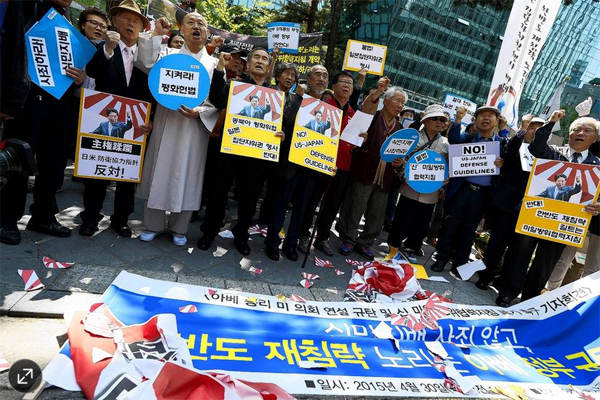Press Release
Japan and South Korea make natural allies in fostering peace and prosperity to northeast Asia.

A WAY FORWARD: South Koreans protest past Japanese military behavior. Rebuilding ties won’t require
the two countries forsake history. It requires not being trapped by it.
PHOTO: JEON HEON-KYUN/EUROPEAN PRESSPHOTO AGENCY
Next week marks the 50th anniversary of the normalization of ties between South Korea and Japan. In recent years the relationship, however, has been anything but normal.
Roiled by tensions over “comfort women” and other disputes, ties between America’s two northeast Asian allies have become downright poisonous. This has hurt U.S. efforts to bolster security and economic ties in the region and to push back against growing Chinese assertiveness.
Now there are signs of a limited thaw, including this weekend’s visit to Tokyo by South Korea’s foreign minister—the first in four years. Washington should take advantage of the opening to bring its allies closer together.
The chief diplomats will meet following several years of deep disaffection between South Korea and Japan. President Park Geun-hye has pledged to stand up for the honor of wartime comfort women and has demanded explicit apologies from Tokyo. Prime Minister Shinzo Abe has emphasized his reaffirmation of previous government statements on the matter, and Japanese officials privately suggest that no new statement would fully sate the Korean desire for repentance.
Differences over history have compounded existing territorial disputes. Both Seoul and Tokyo lay claim to islets in the Sea of Japan, known variously as the Dokdo or Takeshima. Ms. Park and Mr. Abe, despite vigorous international diplomacy with scores of world leaders, have never met with each other one-on-one.
The result has been a sharp decline in public goodwill in both countries toward each other, and a shifting strategic outlook—especially in South Korea. A recent joint survey by Japan’s Genron NPO and Korea’s East Asia Insitute indicates that more Koreans expect a military threat from Japan than from China, and a full third of Koreans expect their country to enter military conflict with Japan at some point in the future.
This puts the U.S. in a difficult position. Poor relations between these two Asian allies makes regional security and economic cooperation more difficult. It also represents a major distraction from the region’s more pressing challenges.
In recent weeks, for instance, North Korea claimed it test-fired a submarine-launched ballistic missile. Meanwhile, U.S. officials have confirmed that North Korea is making progress on miniaturizing nuclear warheads. The country’s mercurial young leader, Kim Jong Un, with his periodic executions at home and saber-rattling abroad, should fix Seoul’s security gaze north, not east.
At the same time, China’s rising assertiveness, including its establishment of an air-defense identification zone (ADIZ) in the East China Sea, demonstrates the importance of a united front among Pacific allies. South Korea has good reason to avoid antagonizing a more assertive China and to hope that improved relations with Beijing might put pressure on Pyongyang. But China’s ADIZ encroachment on South Korean airspace, and its strong-arming of South Korea against hosting U.S. ballistic-missile defenses, reveal that even Seoul is not immune from Chinese coercive pressure.
Perhaps for these reasons, there are signs of a limited thaw in relations between South Korea and Japan. The turn began in December when the two countries agreed with the U.S. to begin sharing intelligence on North Korea.
In May, finance ministers from Seoul and Tokyo met for the first time since 2012, while defense ministers from the two sides met bilaterally that same month for the first high-level security consultations in five years. Now Seoul’s ambassador to Japan says he expects a Park-Abe summit by November.
South Korean officials have begun signaling their move to a “two-track approach,” which would decouple history and territorial disputes from security and economic cooperation with Japan. But there remains a long way to go. In the same joint poll, more than 70% of Korean respondents held negative views of Japan, while more than half of Japanese expressed unfavorable feelings toward Korea—twice the number with positive views.
There are risks should the disputes continue to simmer. Disaffection with Japan hasn’t pushed Seoul into China’s hands, but Beijing has seized the opportunity to drive a large wedge between Japan and Korea. At the same time, Japan is boosting its security cooperation with countries throughout the Indo-Pacific, and that growing pattern of defense ties could isolate Korea from new regional-security configurations.
If there were ever to be a military conflict on the Korean peninsula, Japan would have an interest and potentially a role to play. Such a scenario should be part of any security discussion between two governments that until recently have avoided close contact.
Washington can play an important part in improving relations between Seoul and Tokyo. President Obama last year hosted Ms. Park and Mr. Abe for a trilateral summit in The Hague. Now Washington can help develop a broader conception of the strategic picture in northeast Asia.
Each alliance is strong, but it would be stronger still with a Korea and a Japan that were committed to closer cooperation. From missile defense and maritime security to general cooperation over maintaining access to cyber and outer space, Japan and Korea can do more together than separately.
The best counter to North Korean threats and China’s challenge is a northeast Asia in which the democratic allies are powerful, unified and working together. This doesn’t require forsaking history. It requires not being trapped by it.
President Park recently emphasized the need to focus on the development of “future-oriented bilateral relations” with Japan “on issues that require cooperation.” There are certainly enough of those in Asia today. Building on this limited thaw offers the chance to demonstrate that Washington’s alliances equal more than the sum of their parts.
Mr. Fontaine is president of the Center for a New American Security in Washington, D.C